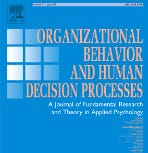New article in OBHDP (December 18th, 2024)
The inclusion of anchors when seeking advice: Causes and consequences
Jessica A. Reif, Richard P. Larrick, Jack B. Soll
https://www.sciencedirect.com/science/article/abs/pii/S0749597824000700
Suppose you are uncertain about how long a project will take to complete. One way to reduce your uncertainty is to ask for advice. When seeking such advice, you might pose an open question, such as, “How long do you think this project will take?” Alternatively, you might ask a question that includes some of your thinking about the problem, such as, “How long do you think this project will take? Do you think 8 weeks is enough time?” In five preregistered studies (N = 6,981), the authors investigated the causes and consequences of including anchors when seeking advice. They first examined how an advice seeker’s motives/goals might impact the likelihood they will include an anchor. They found that when advice seekers are concerned with demonstrating capability and effort to their advisors (impression management goal), they are more likely to include anchors; conversely, when advice seekers are motivated to avoid influencing the advisor (informational goal), they exclude anchors. The authors found that including anchors does lead to more positive impressions of the advice seeker. Detrimentally, however, including anchors harms the accuracy of the final decision. This research suggests that advice seekers should be aware that their desire to “look good” to their colleagues may lead to behavior (anchoring) that unintentionally contributes to less accurate advice.
P.S. if you can’t access the full-text let us (m-kouchaki@kellogg.northwestern.edu or mikebaer@asu.edu) know and we’d be happy to share a copy.


